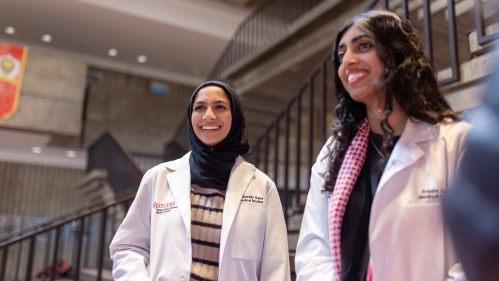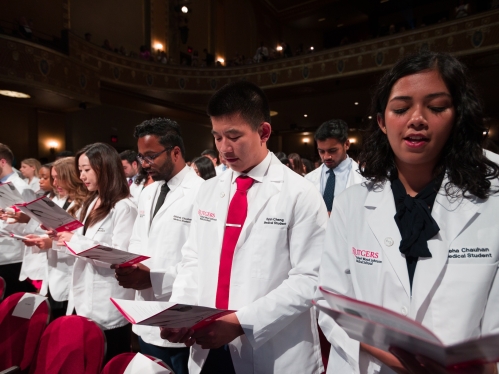
Humanism and Professionalism Programs
The Arnold P. Gold Humanism Honor Society was introduced at Robert Wood Johnson Medical School in 2002. This society completed the quartet of programs below at the medical school, all designed to inspire and teach our students to become more humanistic physicians.
The White Coat Ceremony
This ceremony highlights the importance of humanistic care, and concludes with the taking of the Physician's Oath by all incoming first-year students.
"I vow that as a physician, I will serve humanity by caring for the sick, promoting health and wellbeing, mitigating pain and suffering, and providing kind and compassionate care."

The Arnold P. Gold Humanism Honor Society
The Gold Humanism Honor Society (GHHS) recognizes and honors senior medical students, residents, role-model physician teachers, and other exemplars for “demonstrated excellence in clinical care, leadership, compassion, and dedication to service.” The GHHS is organized to elevate the values of humanism and professionalism within the field of medicine and its constituent institutions. The GHHS advocates for humanism through activities on campus and has continuing involvement with its membership.
Selection of students for GHHS is based upon a review of peer and faculty nominations, which are considered by a selection committee. The selection process for GHHS typically takes place at the end of third-year clerkships for a class. Election to the Gold Humanism Honor Society makes a significant statement to medical school faculty, students, and the public that an institution places high value on the interpersonal skills and attitudes that are essential for excellent patient care. The GHHS designation is included in a student’s Medical Student Performance Evaluation, which is sent to residency programs with a student’s residency application.
Alpha Omega Alpha
The Alpha Omega Alpha (AOA) is the national medical honor society. Its goals are the promotion of scholarship and research in medical schools; the encouragement of a high standard of character and conduct among medical students and graduates; and recognition of high attainment of goals in medical science, practice, and related fields.
Students are elected by the individual chapters of the society on the basis of their academic achievements and on their potential for becoming leaders in the medical profession. Students are elected to AOA in their junior or senior year of medical school. In order to be considered for election to the society, juniors must be in the upper 1/12 of their class and seniors must be in the upper 1/4 of their class. The number of students elected from any class may not exceed 1/6 of those expected to graduate. An alumnus may be elected to AOA, based on achievement, ten years after graduation. In addition, a chapter may elect one member each year from the faculty of medicine at its institution.
The society’s board of directors elects honorary members. The selection process takes place in the spring (March or April) of the third year for Junior AOA and in September of the fourth year for Senior AOA. A committee of faculty and administrators makes the selection. The AOA designation is included in the student’s Medical Student Performance Evaluation, which is sent to residency programs on November 1st of the student’s year of graduation.
Creating a Professional Learning Environment
Robert Wood Johnson Medical School prioritizes a positive academic and clinical learning environment, emphasizing professionalism among all members. Students and faculty are expected to consistently demonstrate professionalism, including appropriate interpersonal interactions, self-improvement, and commitment to responsibility, honesty, and altruism. These attributes, integral to physicianship, are formally assessed throughout training.
Patient Centered Medicine and Health Equity Course
Our Patient Centered Medicine and Health Equity (PCM-HE) course plays a vital role in shaping students into humanistic, professional, and compassionate physicians by promoting values, skills, and attitudes essential for patient-centered care. Through comprehensive instruction and experiential learning, it cultivates empathy, effective communication, cultural humility, and ethical decision-making. Moreover, it fosters self-awareness, resilience, and a commitment to lifelong learning, preparing students to navigate complex healthcare environments with compassion and integrity. Ultimately, the course equips students with the foundational attributes necessary to provide holistic, patient-centered care and uphold the highest standards of professionalism in their medical practice.
